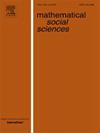Multi-winner rules analogous to the Plurality rule
IF 0.5
4区 经济学
Q4 ECONOMICS
引用次数: 0
Abstract
The aim of this paper is to identify the multi-winner voting rules that can be considered as extensions of the Plurality rule when voters’ preferences are expressed as linear rankings over the candidates. Multi-winner voting addresses the problem of selecting a fixed-size subset of candidates, called a committee, from a larger set of available candidates based on the voters’ preferences. In the single-winner setting, where each voter provides a strict ranking of the candidates and the goal is to select a unique candidate, Yeh (2008) characterized the Plurality rule as the only voting rule satisfying five independent axioms: anonymity, neutrality, consistency, efficiency, and top-only. In this paper, we demonstrate that a natural extension of these axioms to the multi-winner framework allows us to identify a class of top- counting rules as multi-winner analogous to the Plurality rule, that does not contain the classical -Plurality rule.
多赢家规则类似于多数规则
本文的目的是确定多赢家投票规则,当选民的偏好被表示为对候选人的线性排名时,多赢家投票规则可以被视为多数原则的延伸。多赢家投票解决的问题是,根据选民的偏好,从更多的可用候选人中选择一个固定规模的候选人子集(称为委员会)。在单一赢家的情况下,每个选民对候选人进行严格的排名,目标是选择一个唯一的候选人,Yeh(2008)将多数规则描述为唯一满足五个独立公理的投票规则:匿名性、中立性、一致性、效率和top-only。在本文中,我们证明了这些公理的自然扩展到多赢家框架允许我们识别一类顶k计数规则作为多赢家类似于多数规则,它不包含经典的k-多数规则。
本文章由计算机程序翻译,如有差异,请以英文原文为准。
求助全文
约1分钟内获得全文
求助全文
来源期刊

Mathematical Social Sciences
数学-数学跨学科应用
CiteScore
1.30
自引率
0.00%
发文量
55
审稿时长
59 days
期刊介绍:
The international, interdisciplinary journal Mathematical Social Sciences publishes original research articles, survey papers, short notes and book reviews. The journal emphasizes the unity of mathematical modelling in economics, psychology, political sciences, sociology and other social sciences.
Topics of particular interest include the fundamental aspects of choice, information, and preferences (decision science) and of interaction (game theory and economic theory), the measurement of utility, welfare and inequality, the formal theories of justice and implementation, voting rules, cooperative games, fair division, cost allocation, bargaining, matching, social networks, and evolutionary and other dynamics models.
Papers published by the journal are mathematically rigorous but no bounds, from above or from below, limits their technical level. All mathematical techniques may be used. The articles should be self-contained and readable by social scientists trained in mathematics.
 求助内容:
求助内容: 应助结果提醒方式:
应助结果提醒方式:


